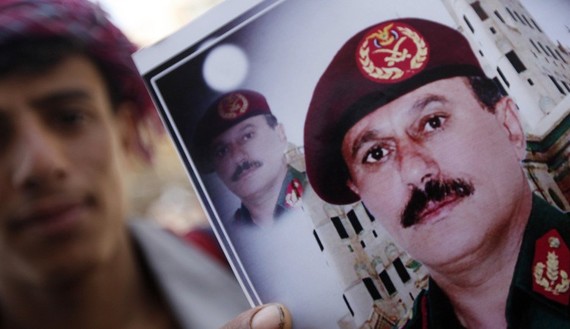On Feb. 26, the UN Security Council unanimously adopted a resolution threatening sanctions against those who hinder Yemen’s political transition. The resolution didn’t identify or blacklist individuals, but instead created a committee to examine potential spoilers in Yemen, and freeze their assets or impose travel bans. The resolution appeared, however, to target former President Ali Abdullah Saleh and his former Vice President Ali Salim al-Beidh, a southern secessionist leader based outside of Yemen.
This is the Security Council’s strongest action yet in relation to Yemen’s political transition. Authorizing its actions under Chapter 7 of the UN Charter, the Security Council sent a very strong message to Yemeni political factions regarding their actions in relation to the transition. Though the resolution primarily aims to sanction or warn Saleh, it also sends a clear message to other political factions, like the Houthis, that if violence continues to be their main tool, they will face the same destiny as Saleh.
The resolution comes after international diplomats and Yemen’s current president, Abed Rabbo Mansour Hadi, expressed concern regarding Saleh’s role in hindering Yemen’s transition, as the former president pushed back against the political process adopted by the international community in Yemen.
Hadi has repeatedly accused Saleh of trying to return Yemen to its pre-2011 order — a claim that is partially true. Considering other regional scenarios — like Syrian President Bashar al-Assad resisting the powerful uprising against him, and the Egyptian military reasserting control of the country — Saleh likely regrets stepping down from power.
Saleh expressed his dissatisfaction with the UN resolution, stating that it is against Yemenis and Yemen. However, his political party later welcomed the resolution, calling on the committee to listen to all political sides and collect information about the spoilers objectively and comprehensively.
The resolution has been controversially received in Yemen. Those opposed to Saleh — including Hadi, his allies in the Islah Party and some independent groups — have largely expressed their happiness with the resolution, seeing it as the only way to ground Saleh and anyone who stands in the way of transition. Other sides have expressed deep unhappiness, such as Saleh’s allies, some religious clerics and the Houthis, stating that it puts the country under a forced international mandate and that it violates Yemen’s sovereignty.
Despite all the controversy, the resolution has resonated in Yemen’s political sphere and has become the topic of almost every political gathering and debate.
The resolution is crucial not just because of its content, but its timing: the second anniversary of Hadi’s rise to power. According to the preliminary deal that brought him to power, Hadi was supposed to leave office about 10 days ago, or at least oversee new, competitive elections. However, Hadi’s term was extended — with the backing of the international community — by the National Dialogue Conference until the transition “ends,” and not according to a timeline. Hadi’s legitimacy had been on the brink, still holding office while having exceeded his term, but there are no signs that the government will prepare for elections any time soon. The UN resolution emphasized that Hadi’s term is connected to the fulfillment of the components of the Gulf Cooperation Council deal.
More importantly, the resolution brings Hadi more power than he has ever enjoyed. In fact, it puts him in a stronger position than when he was first elected. There hasn’t been a single president in Yemen’s history who has enjoyed as much support locally or internationally as Hadi. His ability to translate this support into real transition in Yemen, however, has yet to be tested. The resolution ultimately leaves him as the unquestionable man in Yemen — a status that even his predecessor never enjoyed.
Ultimately, on the ground, while the sanctions committee is a critical step in Yemen’s future, sanctions will not necessarily help improve or move the situation forward. Yemen’s problems at the moment are much more than just spoilers. The current government’s performance is incredibly poor, and it has become very unpopular. The president’s steps toward progress have been too slow. In this environment, the work of spoilers is largely in taking advantage of others’ mistakes. Unless the current government improves its performance, the sanctions committee will be useless and could even backfire. Saleh’s ability to influence Yemen is not derived solely from his wealth or power. Rather, like many other spoilers, he is taking advantage of the public rage against the government.
Currently, Hadi and his Cabinet are in a position to make strong decisions in the realm of security reform and the economy that they were previously unable to take. This resolution is the last magic word they can be given; there is nothing more that can be done to support them. If they seize the opportunity, then they will be — without a doubt — in a very strong place to move Yemen toward stability and peace. If they do not, Yemen’s case will more than likely be declared hopeless.








